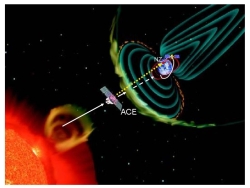Severe space weather effects may degrade the performance of modern telecommunication and Global Navigation Satellite Systems (GNSS). Therefore, solar storms are able to affect our modern infrastructure facilities and installations. As a result, restricted functionality or catastrophic failure of telecommunication and navigation systems could lead to serious economic losses, safety risks or to the restriction of the quality of live.
The objective of the project "Advanced forecast for ensuring communications through space" (AFFECTS), which is led by the Georg-August Universität Göttingen, is to set up a high quality forecast system for predicting strong space weather effects.
This website distributes forecasts and warnings derived from observational data to the AFFECTS consortium and registered users.

- Solar storms can be detected onboard the ACE satellite of NASA just before the plasma cloud enters the Earth's magnetosphere. By routinely receiving ACE data at daytime, DLR Neustrelitz contributes essentially to the early space weather warning system of NOAA.
Support: European Commission, Seventh Framework Programme (FP7)
Consortium:
- Georg-August Universität Göttingen (Prime), D;
- Deutsches Zentrum für Luft- und Raumfahrt (DLR), D;
- Fraunhofer Institute for Physical Measurement Techniques, D;
- EADS Astrium Friedrichshafen, D;
- Belgian Royal Observatory Brussels, Belgium;
- Geophysical Observatory in Tromsø, Norway;
- National Space Research Institute of the Ukraine, Ukraine;
- Space Weather Prediction Center (SWPC) der National Oceanic and Atmospheric Administration (NOAA) in Boulder, USA
Duration: 2011 -2014
Test Time
Please be patient - This page is under construction!







